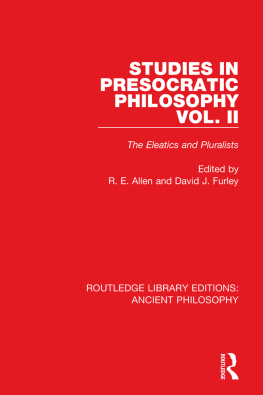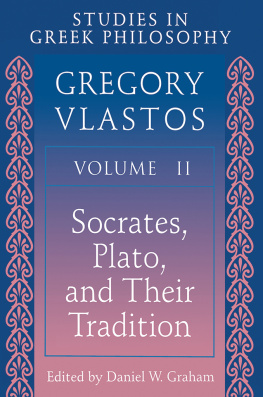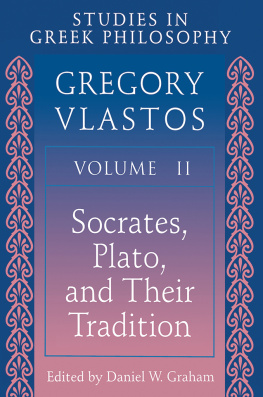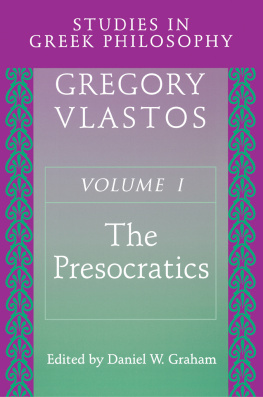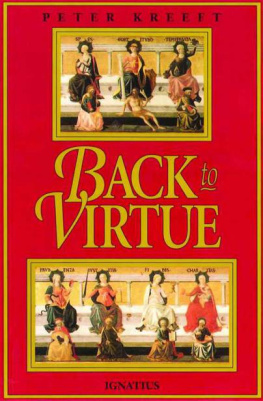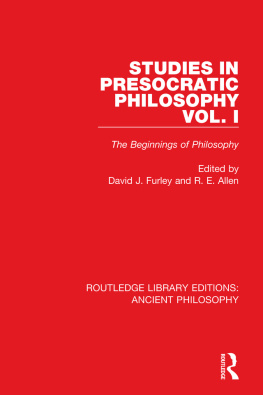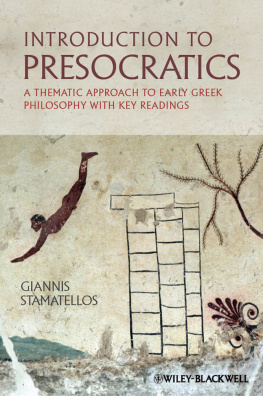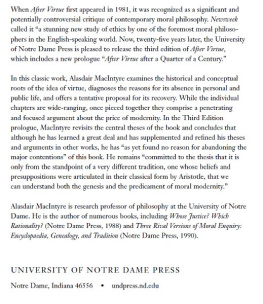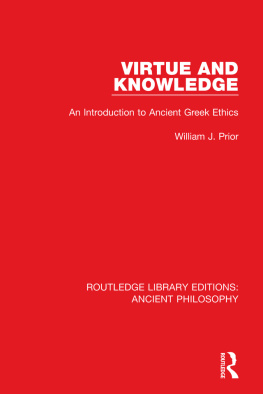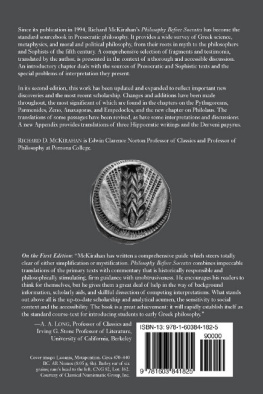Routledge Library Editions: Ancient Philosophy
Volume 5
STUDIES IN PRESOCRATIC PHILOSOPHY VOL. II
Studies in Presocratic Philosophy Vol. II
The Eleatics and Pluralists
Edited by
R. E. Allen and David J. Furley
First published in 1975
by Routledge & Kegan Paul Ltd
This edition first published in 2017
by Routledge
2 Park Square, Milton Park, Abingdon, Oxon OX14 4RN
and by Routledge
711 Third Avenue, New York, NY 10017
Routledge is an imprint of the Taylor & Francis Group, an informa business
1975 Routledge & Kegan Paul Ltd
All rights reserved. No part of this book may be reprinted or reproduced or utilised in any form or by any electronic, mechanical, or other means, now known or hereafter invented, including photocopying and recording, or in any information storage or retrieval system, without permission in writing from the publishers.
Trademark notice : Product or corporate names may be trademarks or registered trademarks, and are used only for identification and explanation without intent to infringe.
British Library Cataloguing in Publication Data
A catalogue record for this book is available from the British Library
ISBN: 978-1-138-20063-0 (Set)
ISBN: 978-1-315-47325-3 (Set) (ebk)
ISBN: 978-1-138-20156-9 (Volume 5) (hbk)
ISBN: 978-1-138-20158-3 (Volume 5) (pbk)
ISBN: 978-1-315-51145-0 (Volume 5) (ebk)
Publisher's Note
The publisher has gone to great lengths to ensure the quality of this reprint but points out that some imperfections in the original copies may be apparent.
Disclaimer
The publisher has made every effort to trace copyright holders and would welcome correspondence from those they have been unable to trace.
Studies in Presocratic Philosophy
Vol. II
The Eleatics and Pluralists
edited by
R. E. Allen
and
David J. Furley
LONDON
ROUTLEDGE & KEGAN PAUL
First published in 1975
by Routledge & Kegan Paul Ltd
Broadway House, 68-74 Carter Lane,
London EC4V 5EL
Set in Monotype Garamond
and printed in Great Britain by
Richard Clay ( The Chaucer Press ) Ltd
Bungay, Suffolk
Routledge & Kegan Paul Ltd 1975
No part of this book may be reproduced in
any form without permission from the
publisher, except for the quotation of brief
passages in criticism
ISBN 0 7100 7949 4
Contents
Hermann Frnkel Professor Emeritus, Stanford University
( Wege und Formen frhgriechischen Denkens, C. H. Beck, 1955; a revised version of the article 'Parmenidesstudien', Nachrichten der Gtting. Gesellsch. der Wissenschaften, 1930, 153-92) |
G. E. L. Owen Lawrence Professor of Ancient Philosophy in the University of Cambridge
( Classical Quarterly , 1960, 84-102) |
A. A. Long Professor of Greek in the University of Liverpool
( Phronesis , 1963, 90-107) |
Hermann Frnkel
( Wege und Formen frhgriechischen Denkens, C. H. Beck, 1955; a revised version of American Journal of Philology, , 1942, 1-25 and 193-206) |
G. E. L. Owen
( Proceedings of the Aristotelian Society 1957-8, 199-222) |
Gregory Vlastos Stuart Professor of Philosophy, Princeton University
( Gnomon , 1953, 29-35) |
Gregory Vlastos
(From a review of H. Frnkel's Wege und Formen frhgriechischen Denkens in Gnomon , 1959, 195-9) |
Gregory Vlastos
( Phronesis , 1966, 3-18) |
Gregory Vlastos
( Journal of the History of Philosophy , 1966, 95-108) |
F. Solmsen Moses Slaughter Professor of Classical Studies in the University of Wisconsin
( Phronesis , 1965, 109-48) |
David J. Furley Professor of Classics, Princeton University
( Journal of Hellenic Studies , 1, 1957, 31-4) |
F. M. Cornford Late Lawrence Professor of Ancient Philosophy in the University of Cambridge
( Classical Quarterly , 1930, 14-30 and 83-95) |
Gregory Vlastos
( Philosophical Review , 1950, 31-57) |
Gregory Vlastos
(From a review of H. Frnkel's Wege und Formen frhgriechischen Denkens, in Gnomon , 1959, 199-203) |
Colin Strang Reader in Philosophy in the University of Newcastle upon Tyne
( Archiv fr Geschichte der Philosophie , 1963, 101-18) |
Gregory Vlastos
( Philosophical Review , 1945, 578-92 and , 1946, 53-64) |
OUR thanks are due to the Aristotelian Society for permission to publish article V, which first appeared in the Proceedings ; to Beck Verlag for article I and supplementary portions of article IV from Wege und Formen, and articles VI, VII and XIV from Gnomon ; to the Clarendon Press for articles II and XII, which first appeared in the Classical Quarterly ; to the Johns Hopkins Press for article IV, which first appeared in the American Journal of Philology ; to the Society for the Promotion of Hellenic Studies for article XI, which first appeared in the Journal of Hellenic Studies ; to Walter De Gruyter and Company for article XV, which first appeared in the Archiv fr Geschichte der Philosophie ; to the Trustees of the University of California and to the editors of the Journal of the History of Philosophy for article IX; to the editors of the Philosophical Review for articles XIII and XVI; and to the editors of Phronesis for articles III, VIII and X.
We wish to acknowledge a special debt of gratitude to Mr Renato Cristi, for his work on the index.
Our thanks are also due to Mrs David Harvey and Professor Michael Frede for help with the translation of articles from German, and to Mr Alan Bowen for help with proof-reading.
R.E.A.
D.J.F.
THIS second volume begins with the Eleatics and continues with those philosophers who argued against the Eleatics or attempted to come to terms with their arguments.
We have again chosen articles that have been published before, as indicated in the table of contents, and we have confined our choice to self-contained articles, as opposed to excerpts from books. We have translated as much as possible of the Greek citations in the original articles. The authors have made some alterations and additions: all major changes are indicated.
These studies deal only with the four major philosophical positions of the period: the arguments of Parmenides and Zeno against earlier or contemporary pluralist theories, and the three pluralist responses of Empedocles, Anaxagoras and the early Atomists. Minor figures have been omitted. In our opinion, those who included are historically the most important philosophers, and the history of philosophy is not greatly distorted if we concentrate attention on them.
We regret that there is nothing directly on Melissus, and that there is only one article on the Atomists. The reason is simply that we found nothing available of the right scope and quality.
I
Studies in Parmenides
Hermann Frnkel
MY intention in the following studies is to correct and extend certain essential aspects of our present knowledge of the system of Parmenides by criticism and interpretation of original fragments and testimonia. In so doing, I shall take particular care to keep close to the wording of the original text, as is done as a matter of course in the interpretation of 'pure' literature, but is easily neglected in the case of a strictly philosophical text, where the content appears to speak for itself, quite independently of the words which happen to be used. And yet much will be radically misunderstood, and many of the best, liveliest and most characteristic features of the doctrine will be missed, if one fails to read the work as an epic poem which belongs to its own period, and to approach it as a historical document, through its language.

